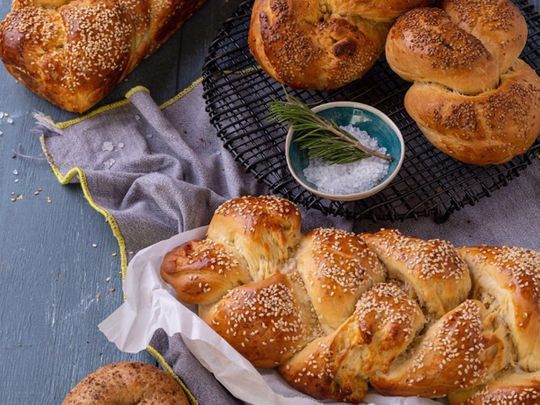Jews in the UAE: From living in the shadows to the stage of openness
[ad_1]

Image Credit: Supplied
Abu Dhabi: Everything in the house of the head of the Jewish Council in UAE, Ross Creel, from paintings, tools of worship and prayer, indicates his religion. This is in addition to books in Hebrew that he teaches his daughter Eve and his son Isaac, in addition to the Torah.
The Creel family, who hail from South Africa, have lived in Dubai since 2013 and practiced their religious rituals openly. Isaac calls Dubai home and says “We are back home” when the family returns to the UAE from abroad.
With the Peace Treaty signed by the UAE and Israel, many things will change in their lives and the lives of nearly 2,000 Jews working and living in UAE, especially in Abu Dhabi and Dubai, which have the largest number of community members.
Thanks to the Peace Treaty, Ross can now contact Israel directly by dialing the international code 972, and he can also travel directly to Tel Aviv to see the rest of his family and friends after he was doing so via Jordan, Cyprus or Turkey, trips he says are tiring and long.
Kosher food
With the arrival of more Jewish families to the UAE, Ross’s wife, Eli, was offering them Jewish food, and after a while, she noticed that the demand for these foods had become great, so she decided to open a restaurant and it was the first Jewish restaurant in Dubai and UAE.
The restaurant opened in February, last year, where Eli serves food with delivery, preparation and catering for Jewish events.
As for the most wanted items, it is the Halah bread and the Babka bread, which is made with chocolate.
Eli explains that the two types are present on every Jewish table and are very common in the United States and Europe, where there are many members of the Jewish community. As for the Jewish food, Eli says it consists of various dishes because it is a mixture of different countries.
Money and banking
The Jews living in the UAE belong to different countries and they work in several fields, especially in the banking and financial sector, in the legal profession, insurance and health, and they are largely integrated into the Emirati society, which includes different nationalities and religions.
Alex Peterfreuind, a Belgian Jew, residing in the UAE and working in the diamond trade since 2008, told BBC News Arabic: “Since my first day in UAE, I have not hidden my religion because I do not think that there is a Muslim who has to hide his religion if he lives in a European country.”
Alex and Ross first started praying together, although Jewish prayer requires at least ten people to take place. But due to their small number at the time and the unwillingness of some of them to reveal their religion publicly, the two men decided to pray alone at Ross’ house.
Today, their number has increased, and prayers are held in its natural form in a synagogue in Dubai, where Jews residing in the emirates gather to practice their rituals and celebrate their religious, social and cultural events.
Religious rites
Levi Dachman, a Jew who arrived from New York five years ago to Dubai, is currently the rabbi of the Jewish community in UAE.
Dachman was the one who blew the Jewish trumpet, or the so-called shofar, during the dawn prayer in honour of the Israeli mission that visited UAE last month on the first direct trip between the two countries.
Dachman says that the Jewish community has been in the UAE for nearly 15 years and has been celebrating and practicing with each other since then.
The Rabbi revealed that a synagogue will be opened very soon in Abu Dhabi within the framework of the Ibrahimi Complex, which will include a mosque and a church in addition to the synagogue.
Peace with UAE is not like any other
Interviewed by BBC News Arabic, some members of the Jewish community in UAE say they were living in extreme silence and privacy, and they expected the Jewish community to become more open with the normalisation agreement.
The head of the Jewish community, Solly Wolf, who has lived in UAE for nearly 20 years, says that it is different from what happened with Egypt and Jordan, where the peoples of Israel, Egypt and Jordan were unable to establish peace due to previous wars between these countries.
Wolf added that many families in Egypt, Jordan and Israel lost their members in these wars, so there is a state of hostility between them, but the situation is different with UAE, as no war occurred between the two parties.
Wolf considers that Israeli peace with Egypt and Jordan was peace between governments and not between peoples, as he put it, so he is not surprised to see an agreement signed between the UAE and Israel.
The head of the Jewish community describes the Emirati society as a welcoming and tolerant society, pointing out that all matters related to the religion of the Jewish community are available in UAE, from kosher food to religious and educational books.
The Jewish community lives just like other Jewish communities in Britain, the United States, or elsewhere in the world, thanks to the facilities provided by the UAE government to the Jewish community.
With the signing of the Peace Treaty, the Jewish community in the UAE expects to expand its area numerically and geographically, with the expectation that Israelis will arrive in the UAE for business or living.
[ad_2]
Source link

